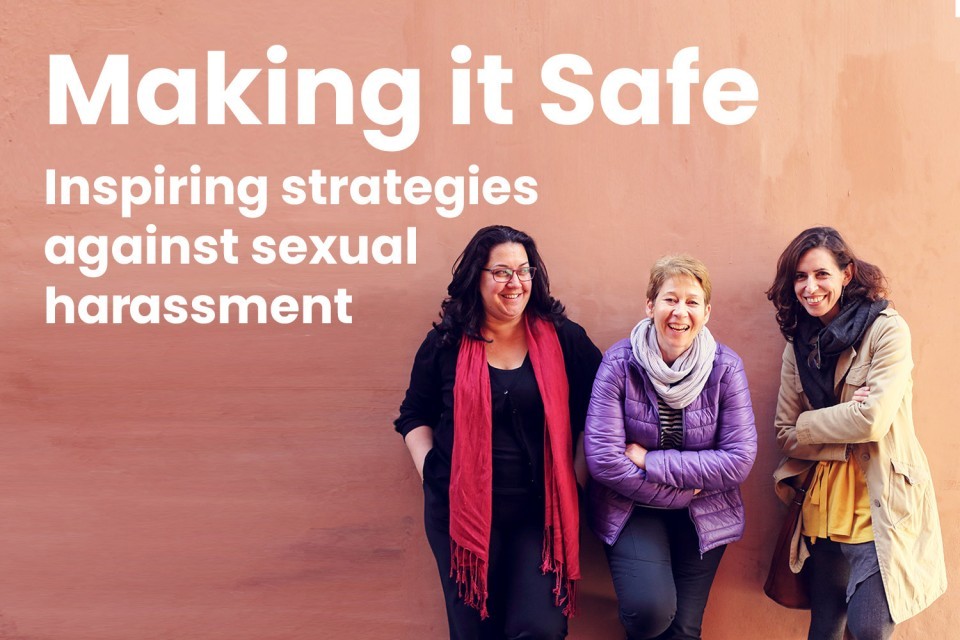
Making it Safe
All of us want to feel safe. No matter where we’re from or what work we do or the communities we belong to, we deserve to feel safe. And most of us want the same for others, too, whether family, friends, acquaintances or strangers.
Unfortunately, sexual harassment threatens our safety and it can happen in the most familiar of relationships and places. When someone experiences sexual harassment, they are very likely in a position of unequal power with their harasser. This makes it even harder for them to stop any unwanted sexual advances so they can feel safe. And when sexual harassers aren’t stopped, all too often their harassment escalates, and worse into assault.
As women, we can come together to inspire and develop personal strategies against sexual harassment. By sharing our lived experiences, we can discover and adopt more strategies for making places and relationships safe for ourselves and others.
If you’d like to join others in making it safe, the Making It Safe: Inspiring strategies against sexual harassment programme is for you. During the programme, you will explore what has worked for you in the past, and you will learn other women’s strategies that have made them and others safe, so you can adjust and apply these immediately.
This customisable programme can be conducted over several sessions or over a day. It consists of six themes:
Theme 1: Knowing when you’re not safe
What signals let you know when you’re not safe? What helps you pay attention to these signals? What stops you paying attention to them?
Theme 2: Behaviours and actions
When you’re not feeling safe, what behaviours or actions, whether yours or others’, make it safe for you?
Theme 3: Beliefs, attitudes and state
What kind of beliefs, attitudes or state support you in making it safe for yourself and for others?
Theme 4: Stories
What kind of stories, including from others, inspire you to make it safe for yourself and for others?
Theme 5: Allies
What kind of ally would make it safe for you and others? What examples of allyship do you already have? When have you been an ally to others?
Theme 6: What would you like to have happen next?
What will you be doing next to make it safe for yourself and others?
As well as these six themes, which have emerged through interviews and focus groups, there will be space to develop themes of significance for programme participants. The aim is for every participant to leave with insights, understanding and inspiration.
This programme will be facilitated by Jacqueline Ann Surin, an expert facilitator who has worked with and trained several women’s groups in Malaysia and the region. She will facilitate the group cleanly, with curiosity, respect and gentle humour.
Note: We will not be able to provide therapy for any experience you may have had with unwanted sexual advances. We can however help you find resources and support if that is what you need.
Testimonials
When I attended a "Keeping Safe From Unwanted Sexual Advances" workshop, I listened to various stories and realised there was a lot of pragmatism and that every situation was different. Every woman made a quick assessment of many factors. They didn’t seem to panic and didn’t seem to challenge overtly. There was an inner assertion and a steady response. About a month after, I had a new male client. During the consultation, he was friendly but weird. I noticed my heart beat go up and I felt breathless. I still doubted myself but I could feel myself making assessments like the women in the workshop had described i.e. was there a clear line of exit, how strong did he look, did I need to text my friends? When I started the massage, he moved one arm under himself. I was still questioning what was actually happening. I noticed my heartbeat was much faster and I was more breathless. And I thought, "I have to trust this reaction" as it became clear he was acting inappropriately. I did not want to challenge him. I was frightened. I declared I was stopping the massage, and said I didn’t feel very well. I asked him to leave. He seemed reluctant but I repeated myself strongly. I watched him get dressed rather than turn my back on him even for a moment. He left. What I gained from the workshop was a process of relatively clear thinking despite the physical reaction in me that could have been quite disabling. I used my voice to be very assertive without accusing him of anything. Throughout the incident, I was replaying the workshop in my mind as I worked out what I was going to do.
Jennifer Naylor, Massage Therapist, UK
This programme helped me learn and understand new stories, experiences and views from different women from different settings, contexts and background. I totally recommend it to other women.
Siti, Social Worker, WAO, Malaysia
The world isn't always a safe place for women, but Jacq created a safe place for us within this course, a place where we could share and learn and grow--it felt subversive and like being part of a club of women who are taking a stand. I loved how empowered I felt by the other women's stories--this was the education I never got about how to move through the world, something I desperately needed and didn't know I was missing. It was a powerful way to grow in my intuition and learn about myself as well as others.
Jamie Burgess, Boston, USA
Upcoming events
We don’t have any events listed at the moment. If you are interested in this course, please complete this form and we will be in touch when we have available dates.
Related blog posts
How to research and design a programme cleanly
23rd Nov 2023

